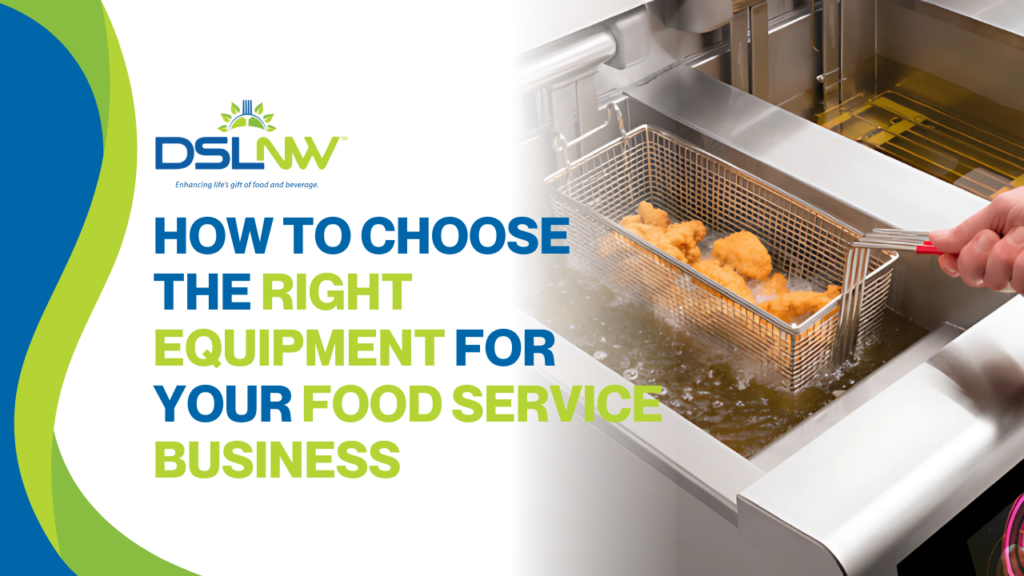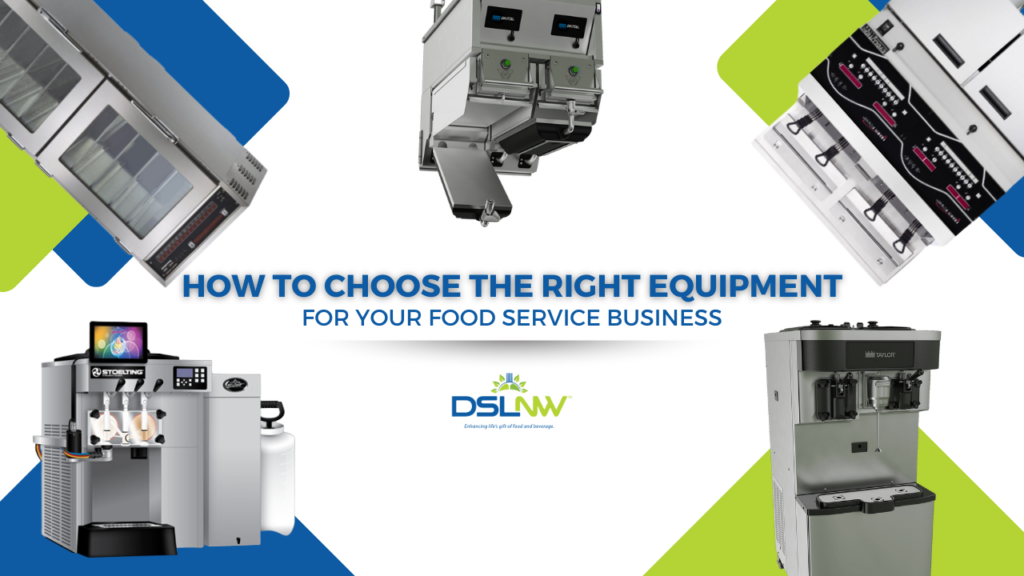
How to Choose the Right Equipment for Your Food Service Business
Choosing the right equipment for your food service business can feel like navigating a maze, but it’s a critical step for ensuring success. The right tools can streamline operations, improve food quality, and even cut down on costs in the long run. So, how do you go about selecting the best gear for your needs? Let’s dive into this comprehensive guide to help you make the best choices for your restaurant or food service business.
Understanding the Basics of Food Service Equipment
The Importance of Quality Equipment
Quality equipment is the backbone of any successful food service operation. It’s not just about having tools that get the job done; it’s about ensuring efficiency, safety, and longevity. High-quality equipment reduces the risk of breakdowns, which can lead to costly repairs and lost revenue. Moreover, it enhances the overall customer experience by helping to produce consistent, high-quality food.
Common Types of Food Service Equipment
When it comes to food service equipment, there’s a wide variety available. From ovens and grills to commercial ice cream makers and coffee machines, each piece plays a vital role in the daily operations of a restaurant. Some common equipment includes:
- Ovens and Grills: Essential for cooking a wide range of dishes.
- Refrigeration Units: Important for keeping ingredients fresh.
- Commercial Ice Cream Makers: Perfect for dessert offerings.
- Flat Top Grills: Versatile for various cooking styles.
Assessing Your Business Needs
Determining Your Menu and Services
Your menu will largely dictate the type of equipment you need. A fast-food chain will require different tools than a steakhouse or an ice cream parlor. Start by outlining your menu and identifying the equipment necessary to prepare each dish. For instance, if you plan to serve ice cream, investing in a high-quality commercial ice cream maker, such as those offered by Taylor, is a must.
Understanding Your Kitchen Space
Space is a premium in most kitchens, so it’s critical to choose equipment that fits well within your layout. Measure your kitchen area and plan the placement of each piece of equipment. Remember, having enough space for staff to move around and work efficiently is just as important as the equipment itself.
Budget Considerations
Equipment can be a significant investment. Set a budget and prioritize essential items first. While it might be tempting to go for the cheapest options, investing in quality equipment from reputable brands like Henny Penny or Taylor can save you money in the long run by reducing maintenance and replacement costs.
At DSL Northwest, our team of experts is here to help assess your specific kitchen needs to ensure you have the right equipment for your business. Whether you’re running a fast-food chain, a fine-dining steakhouse, or an ice cream parlor, we will consult and guide you to determine the essential tools based on your menu and available kitchen space. We also take budget considerations seriously, offering guidance on investing in high-quality equipment from trusted brands like Taylor and Henny Penny, helping you maximize efficiency and reduce long-term costs.
Essential Equipment for Different Food Service Businesses
Fast Food Restaurants
Fast food joints typically require equipment that can handle high-volume production efficiently. Key items might include:
- High-capacity fryers
- Speed ovens
- Flat top grills
- Holding cabinet/equipment
Cafes and Coffee Shops
For cafes, the focus is often on beverages and light meals. Essential equipment might include:
- Espresso machines
- Panini presses
- Display refrigerators
Full-Service Restaurants
Full-service restaurants need a wide range of equipment to handle a diverse menu, including:
- Commercial ovens
- Grills and griddles
- Refrigeration units
- Holding cabinet/equipment
Ice Cream Parlors
An ice cream parlor needs specialized equipment to create and serve a variety of frozen treats:
- Commercial ice cream makers
- Soft-serve machines
- Freezers for storage
Key Factors to Consider When Choosing Equipment
Energy Efficiency
Energy-efficient equipment can significantly reduce your operating costs over time. Look for Energy Star-rated appliances, which are designed to use less energy without compromising performance. This not only helps save on utility bills but also contributes to a more sustainable business operation.
Durability and Maintenance
Durability is key when it comes to food service equipment. Invest in items made from high-quality materials that can withstand the rigors of a busy kitchen. Additionally, consider the ease of maintenance—equipment that’s easy to clean and service can save you time and money in the long run.
Brand Reputation and Support
Brands like Henny Penny and Taylor have built solid reputations in the industry for a reason. They offer reliable equipment and excellent customer support. When choosing equipment, consider brands that provide comprehensive warranties and have a track record of durability and performance.
Popular Brands in the Food Service Industry
Henny Penny
Henny Penny is known for its high-quality cooking equipment, particularly fryers and combi ovens. Their products are designed for efficiency and durability, making them a popular choice among fast-food chains and full-service restaurants.
Taylor
Taylor is a go-to brand for ice cream and frozen dessert equipment. Their machines are user-friendly and designed for high-volume production, making them ideal for ice cream parlors and restaurants looking to add a dessert menu.
Notable Oven and Grill Brands
When it comes to ovens and grills, brands like Vulcan and Garland are top choices. They offer a range of products from convection ovens to flat-top grills, known for their durability and consistent performance.
Specific Equipment to Consider
Ovens and Grills
Choosing the Right Oven
Ovens are a staple in any kitchen, and choosing the right one depends on your menu and volume. Convection ovens are great for baking and roasting, while deck ovens are ideal for pizza. Consider the size and features, such as programmable settings, to suit your needs.
Selecting the Best Flat Top Grill
Flat top grills are versatile, allowing you to cook a variety of foods from pancakes to burgers. When selecting a grill, look for one with even heat distribution and a durable cooking surface. Brands like Vulcan offer high-quality flat top grills that are built to last.
Ice Cream Makers
Commercial Ice Cream Makers
If ice cream is a part of your menu, investing in a commercial ice cream maker is crucial. Look for machines that offer consistent freezing and have a high output capacity. Taylor offers some of the best commercial ice cream makers, known for their reliability and ease of use.
Tips for Selecting the Right Model
When choosing an ice cream maker, consider factors like production capacity, ease of cleaning, and the type of ice cream or frozen dessert you plan to serve. Some machines are designed for soft-serve, while others can handle a variety of frozen treats.
Shopping for Equipment
Where to Buy Restaurant Equipment
You can purchase restaurant equipment from various sources, including specialty suppliers like DSL Northwest. They offer a range of high-quality equipment from leading brands. Whether you’re looking for a grill, an ice cream maker, or a full kitchen setup, choosing a reputable supplier ensures you get reliable products and support.
Ensuring Compliance with Health and Safety Regulations
Before purchasing any equipment, ensure it meets local health and safety regulations. This includes proper certifications and compliance with standards set by organizations like NSF International. This not only ensures the safety of your food but also helps you
Choosing the right equipment for your food service business is an important step in ensuring long-term success. By investing in high-quality, durable, and energy-efficient equipment, you can improve efficiency, food quality, and customer satisfaction while reducing operational costs. Whether you run a fast-food restaurant, cafe, or ice cream parlor, understanding your menu, kitchen space, and budget will guide your equipment choices. Prioritize reputable brands and ensure your purchases meet health and safety regulations to create a smooth and safe operation. With the right tools in place, your business is set up for growth and success.

FAQs
What is the most important equipment for a food service business?
The most important equipment depends on your business type and menu. For instance, ovens and grills are crucial for restaurants, while espresso machines are essential for cafes. However, refrigeration units are universally important for any food service business to keep ingredients fresh and safe.
How often should I replace my restaurant equipment?
The lifespan of restaurant equipment varies based on usage, quality, and maintenance. High-quality equipment can last several years if properly maintained. Regular servicing and cleaning can extend its life, but most businesses start considering replacement when performance declines or repair costs become frequent, typically after 5-10 years.
What are the benefits of investing in high-quality equipment?
Investing in high-quality equipment improves efficiency, reduces the risk of breakdowns, and ensures consistent food quality. While the initial cost might be higher, durable and energy-efficient equipment can save money over time by minimizing repairs, replacements, and energy bills. It also contributes to a better customer experience.
Can I lease equipment for my restaurant?
Yes, leasing equipment is a common option for restaurant owners who want to reduce upfront costs. Leasing allows you to use high-quality equipment with lower initial expenses, and some leasing agreements include maintenance. However, consider the long-term costs of leasing versus buying, especially for essential items.
How can I ensure my equipment meets health and safety standards?
To ensure your equipment meets health and safety standards, check that it is certified by organizations like NSF International, which guarantees compliance with sanitation and food safety regulations. Also, regularly inspect and maintain your equipment to adhere to local health codes, ensuring a safe and efficient kitchen environment.
Comments are closed.